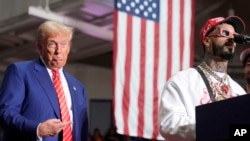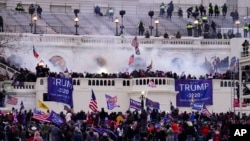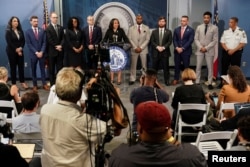With just over nine weeks to go until the U.S. elections, Republican presidential nominee Donald Trump is being forced to balance his time on the campaign trail with attention to the multiple criminal trials that have dogged him for much of the last two years.
Legal battles involving the former president are playing out across four jurisdictions, in both federal and state courts, an unprecedented situation for a major party presidential candidate — a fact that Trump’s legal team frequently points to in its arguments that proceedings should be delayed past the election.
In some cases, their arguments have been bolstered by a Supreme Court ruling in July that found presidents have significant immunity from prosecution for actions they take while in office, and placed limits on the kind of evidence that can be presented if a former president is charged with a crime.
New York case
In its latest move, the Trump legal team asked that a New York state criminal trial, in which Trump was found guilty of 34 felonies connected to the falsification of business records, be transferred to a federal court prior to sentencing, which is scheduled for September 18.
The charges in this case stem from payments Trump had his former attorney make to an adult film actress to prevent her from revealing that she and Trump had a sexual encounter years before, while the president was married to his current wife. The former president was found guilty of falsifying documents to make it look as if his company was paying legal fees to his attorney when he was, in fact, reimbursing him for the original payment. Trump has denied the liaison.
In their request to have the trial removed from state court, Trump’s attorneys argue that failure to do so will permanently damage his presidential candidacy and his supporters. “The ongoing proceedings will continue to cause direct and irreparable harm to President Trump — the leading candidate in the 2024 presidential election — and voters located far beyond Manhattan,” they wrote.
The tactic appears to be a long shot. The request was submitted to the same federal judge whom Trump’s team had previously approached with a similar demand earlier in the case, only to have its bid rejected.
January 6 case
In a separate case, Trump is facing charges related to his effort to overturn the 2020 presidential election results and his role in fomenting the riot at the U.S. Capitol on January 6, 2021, in which thousands of the former president’s supporters sought to violently disrupt the certification of Joe Biden’s election victory.
It was this case that generated Trump’s appeal to the Supreme Court on the ground of presidential immunity. That created a delay of several months and forced Jack Smith, the special counsel appointed to investigate Trump’s role in the riot, to rewrite his indictment in a way that conformed with the high court’s ruling.
On Wednesday, Smith filed a superseding indictment in the case. While some of the evidence Smith cites has changed, the four charges have not. Smith alleges that Trump committed conspiracy to defraud the U.S. government, conspiracy to obstruct an official proceeding, obstruction of an official proceeding, and conspiracy against rights.
The Department of Justice has informal guidelines that instruct prosecutors not to take high-profile steps in cases involving public figures within 60 days of an election. At the time the new indictment was filed, election day was 70 days out, but Trump claimed that because early voting will begin in September in some states, Smith was violating the rule.
“It is DOJ policy that the Department of Justice should not take any action that will influence an election within 60 days of that election – but they just have taken such action,” Trump wrote on his social media website Truth Social. “Voting starts on September 6th, therefore the DOJ has violated its own policy – Election Interference. All of these Comrade Kamala/Biden Hoaxes should be immediately DISMISSED!”
Documents case
The status of the other federal charges brought against Trump is uncertain.
The former president was indicted in Florida in June 2023, after federal officials spent years on fruitless attempts to persuade him to return a large cache of classified documents that he kept after leaving the White House. Eventually, the FBI executed a search warrant at his property and took possession of hundreds of pages of material classified as secret and top secret.
The charges in the documents case were also filed by Smith and included willful retention of national defense information and conspiracy to obstruct justice. The case was assigned to Judge Aileen M. Cannon, a jurist with limited experience who had been appointed to her position by Trump.
After progressing at a very slow pace for more than a year, Cannon surprised many legal professionals by dismissing the case entirely, without addressing the charges themselves. She based the dismissal on her contention that Smith was improperly appointed and therefore lacked the standing to bring charges.
On Monday, Smith appealed the dismissal. Because previous challenges to special counsel appointments have failed, it appears likely that Cannon’s decision will be overturned. However, the process could stretch well past the election.
If Trump were to win the White House again, it is generally assumed that he would instruct the Department of Justice to drop both the documents case and the January 6 case.
Georgia election interference
The fourth criminal trial in which Trump is involved is likewise in a state of suspension pending an appeals court ruling. Last year, Trump and 18 others were named in a sweeping racketeering indictment that charged them with taking various measures to overturn the results of the election in Georgia, where he narrowly lost to Biden.
The most well-known of these actions was Trump’s phone call to the Georgia secretary of state, during which he was captured on tape urging the official to “find” enough votes to reverse the result.
Although the prosecution scored some early wins with Trump associates who pleaded guilty, the case hit a wall in January, when it was disclosed that Fulton County District Attorney Fani Willis, who brought the indictment, had a romantic relationship with outside attorney Nathan Wade, whom she had hired to take the lead in trying the case.
Trump’s legal team asked the judge to dismiss the case, claiming that the relationship between Willis and Wade constituted a conflict of interest prejudicial to Trump. The judge criticized Willis for a lapse in judgment but determined that no conflict existed.
Trump’s team immediately appealed that finding, and the case has been stalled ever since. Whatever the appeals court decides is likely to be appealed to the state’s Supreme Court, meaning that no progress in the case is expected until 2025 at the earliest.








